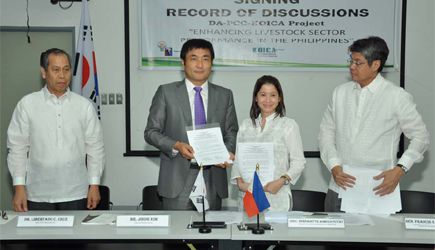The records of discussions (ROD) regarding the formal initiation of a US million grant-in-aid project on “Enhancing Livestock Sector Performance in the Philippines” of the Korean government, were signed by representatives of the Korea International Cooperation Agency (KOICA) and the Department of Agriculture (DA) last November 5.
KOICA resident representative and implementation survey team leader Jinoh Kim and Agriculture Undersecretary for Special Concerns Bernadette Romulo-Puyat signed the ROD documents. Senator Francis Pangilinan and Philippine Carabao Center (PCC) executive director Dr. Libertado Cruz witnessed the signing ceremony.
The project, when finalized, will be jointly implemented by KOICA and the PCC.
The Philippine government’s counterpart to the project is the mobilization of resources and personnel. It will allocate funds for the delegation of technical personnel, equipment and materials.
The project, which will be implemented in a period of three years, aims to establish an institutionalized electronic data capture system that will hasten genetic data evaluation and analysis and create a unified web-based genetic information system.
It shall also intensify artificial insemination (AI) service and the use of embryo technologies that will aggressively enhance propagation of superior animals. This will be actualized through the improvement of the PCC National Bull Farm and Semen Laboratory in Carranglan, Nueva Ecija.
Cryobanking is another aspect that will be improved through the provision of equipment relevant to allow the conservation of selected livestock species that will sustain a long-term genetic improvement program.
Another component of the project is to enhance the competencies of PCC along the disciplines of breeding, genomics, bioinformatics, biotechnology and related fields by training scientists in advanced technologies in Korea.
Dr. Liza Battad, PCC chief for Planning and Special Projects, said that the signed ROD will be submitted to the KOICA headquarters in Seoul then returned to the Philippines for the final discussion on the details of the implementation plan with the KOICA technical team and the PCC.
Dr. Battad said that the project will be formally launched after the signing of the Note Verbales between the embassies of Korea and the Philippines, which is expected to be initiated before year-end.
She emphasized the complimentary effects of the project to the overall national genetic improvement program.
“By improving efficiencies and establishing a systematic performance evaluation, genetic gains will redound to the farmers’ level through increased milk production, animal holdings and, thus, family income,” she said.
“These effects may only be felt toward the end of the project but what remains important is the stream of outcomes supporting the local livestock industry development. These include, among others, generation of rural incomes, employment, and better rural family conditions,” she added.
KOICA is an agency of the government of Korea that extends assistance to developing countries through development cooperation efforts that carry the goals on achieving sustainable socio-economic development, poverty alleviation and promotion of humanitarian assistance and human security.

